Here’s the latest reader question, along with my reply!
Glenn asks: Tesla out Mercedes Benz in. Amazon purchases 1800 electric delivery van in their move to go green. Thoughts?
My reply: Amazon needs delivery vans – electric or otherwise – and Tesla doesn’t make them. Mercedes does -the Sprinter – which Amazon has committed to buying, in electric form. These vans have plenty of room. As for range . . . well, the usual problems. Plus cost, of course. 
But Amazon had to buy these vans because in Deutschland, the government has decreed that electric muss sein by very soon. There are already parts of Germany inaccessible to vehicles that aren’t electric – or areas where access is restricted. It makes no sense – given the insensibility of the EV decrees – to invest millions in a fleet of delivery vans that can’t deliver. So instead, more millions in a fleet of EV delivery vans that can.
Just not as quickly.
. . .
Got a question about cars, Libertarian politics – or anything else? Click on the “ask Eric” link and send ’em in!
If you like what you’ve found here please consider supporting EPautos.
We depend on you to keep the wheels turning!
Our donate button is here.
If you prefer not to use PayPal, our mailing address is:
EPautos
721 Hummingbird Lane SE
Copper Hill, VA 24079
PS: Get an EPautos magnet or sticker or coaster in return for a $20 or more one-time donation or a $10 or more monthly recurring donation. (Please be sure to tell us you want a magnet or sticker or coaster – and also, provide an address, so we know where to mail the thing!)
If you’d like an ear tag – custom made! – just ask and it will be delivered.
My latest eBook is also available for your favorite price – free! Click here. If that fails, email me at [email protected] and I will send you a copy directly!











Not to mention the cost of setting up a proper charging station for the ev. And the cost of electricity most likely generated by coal to power the ev and the charging stations. And the maintenance for the charging station. And the lack of taxes on evs so a new tax to make up for the shortfall of road maintenance. And the charging station will boost property taxes………………………
But isn’t there an economic case for delivery vans (& other work vehicles for that matter) to be electric? 1) They keep local, 2) They come home every night, 3) routine maintenance is less, esp if the powertrain employs regenerative braking. I could see cab, delivery van, and school bus fleets all being electric as a good economic case for those uses. Hell, electric cars would be even good for consumer usage, especially as a purpose-commuter, if they didn’t cost so much to acquire.
Hi Tom,
No.
The EV costs twice or more its IC equivalent and costs again in down time as well as replacement time – which comes sooner due to battery degradation.
A delivery can like a Grumman LLF can last 30-40 years. No EV can match that.
Look at the post office. Bought a fleet of vehicles many years ago. like 250,000.00 or so (my number may be of but I don’t feel like reseaching it now, a large number in any event), All at one time, they are all still running. Not the most exciting ride but hey, thirty years for the current fleet. I think they are are in the process of letting a contract for a replacement fleet. Hope it’s not electric. I am sure Eric can amplify on the post office vehicles.
Hi Ugg,
Yup! Not many are hip to the Grumman LLV – Long Life Vehicle – which for decades has served as the ubiquitous delivery vehicle, used by the Post Office and other such. They are very simple, very tough vehicles designed to have a very long life. As in 30 years or more, even. No EV that actually exists – not the promised (endlessly) “breakthrough” – can even approach the demonstrated service life/low cost of ownership of an LLV, or even of a diesel-powered delivery van.
The only reason Amazon bought the electric Sprinter vans (the diesel version being far superior) is because Amazon has to buy them. Germany has outlawed non-EVs in many areas and the plan is to outlaw non-EVs entirely within the not-very-distant future. Amazon isn’t going to buy delivery vans it can’t make deliveries with – or which it will have to sell/throw away before they even begin to get tired.
“Local” is a relative term. Both FedEx and Amazon, for example, distribute to my area (not tiny, either- about 140-150K population between two conjoined towns) from another city about 50 miles away. UPS is in town, but it *also* has a similar local delivery radius, just from here instead. The routes themselves, of course, are exceptionally longer than just that 50 mile radius, too- lots of meandering to and fro within that bubble.
Electric *might* be logistically feasible (we’ll set aside the economics for now) in some major metro areas with denser population spread (and so a correspondingly lesser delivery radius for a similar number of customers or end-point deliveries counted), but it’s totally untenable in most of the midwest, the great plains, the intermountain west- and plenty of others. Same basic reason passenger rail really only works at scales provided by very specific commuter routes to and from large cities, and the eastern corridor (which is just a string of large cities close together). It’s far too spread out, otherwise, and you don’t have a similar density of nodes for most logistics.
Again, all this is just the logistic feasibility, and the business economics are a concern even beyond that.